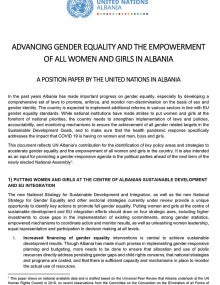1 - 6 of 6 Results
Date:
In response to the novel coronavirus (COVID-19) pandemic and the relatively limited data available, the UN Women Regional Office for Europe and Central Asia, through the Making Every Woman and Girl Count global programme, developed a rapid survey assessment tool to assess the gendered impacts of COVID-19 on the main challenges faced by on women and men lives and livelihoods.
Date:
In May 2020, UN Women initiated online consultations with gender equality mechanisms from 14 countries in the Western Balkans and Turkey, Eastern Partnership and Central Asia sub-regions to discuss challenges and priorities for the gender dimensions of the short- and long-term COVID-19 response.
Date:
The report on “The impact of the COVID-19 pandemic on specialist services for victims and survivors of violence in the Western Balkans and Turkey: A proposal for addressing the needs” is a rapid assessment of specialist services to women who experienced violence to better understand the challenges posed to service delivery, as well as to explore new opportunities for innovative approaches in light of the COVID-19 pandemic. The rapid assessment was undertaken within the EU-UN Women Regional Programme “Implementing Norms, Changing Minds.”
Date:
The "2018 Public Perceptions of Gender Equality and Violence against Women" Infosheets provide insight of current and dominant attitudes and perceptions (and the factors that influence them) toward gender equality and violence against women at community level in the Western Balkans and Turkey.
Date:
Funded by the European Union and implemented by UN Women, the three-year programme, ‘Implementing Norms, Changing Minds’, aims at ending gender-based discrimination and violence against women in the Western Balkans and Turkey. The newsletter highlights stories of women leading change to end violence against women in the region as well as news and the latest updates on the development of the programme.
Date:
This brief offers a glimpse at how UN Women makes a difference in Europe and Central Asia in gender-responsive budgeting by cooperating with national and local partners to tailor this approach to their priorities.






